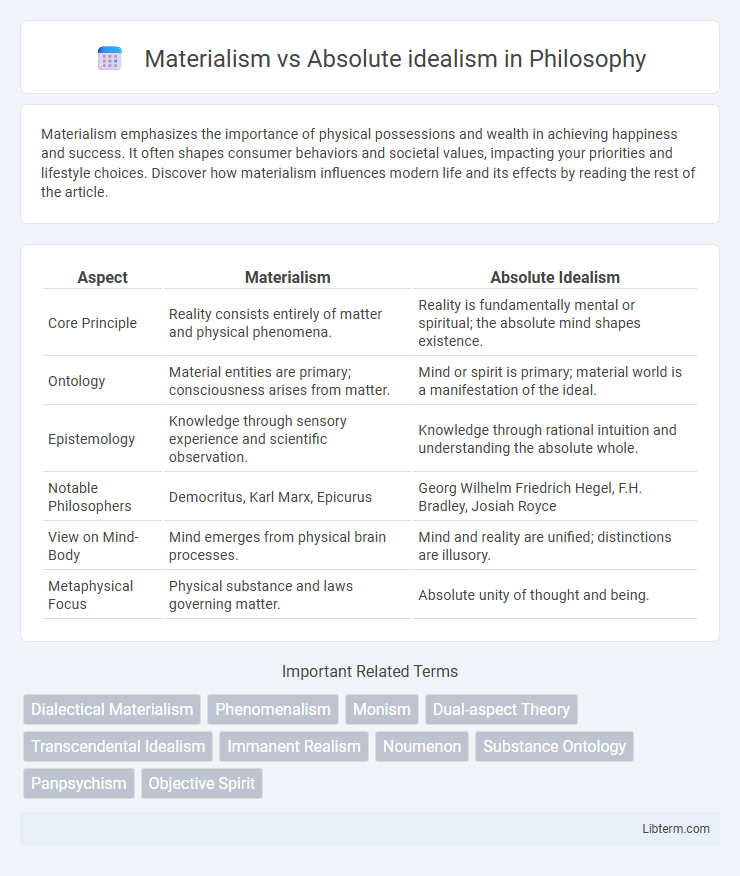Materialism emphasizes the importance of physical possessions and wealth in achieving happiness and success. It often shapes consumer behaviors and societal values, impacting your priorities and lifestyle choices. Discover how materialism influences modern life and its effects by reading the rest of the article.
Table of Comparison
| Aspect | Materialism | Absolute Idealism |
|---|---|---|
| Core Principle | Reality consists entirely of matter and physical phenomena. | Reality is fundamentally mental or spiritual; the absolute mind shapes existence. |
| Ontology | Material entities are primary; consciousness arises from matter. | Mind or spirit is primary; material world is a manifestation of the ideal. |
| Epistemology | Knowledge through sensory experience and scientific observation. | Knowledge through rational intuition and understanding the absolute whole. |
| Notable Philosophers | Democritus, Karl Marx, Epicurus | Georg Wilhelm Friedrich Hegel, F.H. Bradley, Josiah Royce |
| View on Mind-Body | Mind emerges from physical brain processes. | Mind and reality are unified; distinctions are illusory. |
| Metaphysical Focus | Physical substance and laws governing matter. | Absolute unity of thought and being. |
Introduction to Materialism and Absolute Idealism
Materialism asserts that physical matter is the fundamental substance of reality, emphasizing that all phenomena, including consciousness, arise from material interactions. Absolute idealism posits that reality is fundamentally mental or spiritual, where the material world is an expression of an all-encompassing absolute mind or spirit. These contrasting metaphysical frameworks shape diverse interpretations of existence, knowledge, and the nature of consciousness.
Historical Origins and Key Thinkers
Materialism originated in ancient Greek philosophy with thinkers like Democritus and Epicurus, emphasizing matter as the fundamental substance of reality. Absolute idealism developed in the late 18th and early 19th centuries, primarily through the work of German philosophers such as G.W.F. Hegel, who argued that reality is an expression of an absolute, all-encompassing mind or spirit. Both philosophies shaped modern metaphysical debates by positing contrasting views on the nature of existence and consciousness.
Fundamental Concepts of Materialism
Materialism asserts that matter is the fundamental substance in nature, and all phenomena, including consciousness and thought, arise from material interactions. It emphasizes physical processes and empirical evidence as the basis for understanding reality, rejecting the existence of immaterial or spiritual entities as primary causes. This contrasts with Absolute Idealism, which posits that reality is fundamentally mental or spiritual and that material objects are manifestations of an underlying, all-encompassing consciousness.
Core Principles of Absolute Idealism
Absolute Idealism asserts that reality is fundamentally mental, with all objects and experiences existing within an interconnected, conscious whole or Absolute Mind. This philosophy prioritizes the unity of thought and being, positing that individual consciousnesses are manifestations of a single, all-encompassing spirit or idea. Unlike Materialism, which bases existence on physical substance, Absolute Idealism emphasizes the primacy of ideas and the rational structure underlying reality.
Ontological Differences: Reality and Existence
Materialism asserts that reality consists fundamentally of physical matter and its interactions, emphasizing tangible existence and observable phenomena. Absolute idealism posits that reality is fundamentally mental or spiritual, with existence dependent on an all-encompassing consciousness or rational mind. The ontological divide centers on whether existence is rooted in material substance or in a holistic, mental unity that underlies and shapes all things.
Epistemological Perspectives: Knowledge and Perception
Materialism asserts that knowledge and perception arise solely from physical interactions and sensory experiences rooted in the material world. Absolute idealism, by contrast, posits that reality and knowledge are manifestations of a universal consciousness or mind, where perception is a cognitive process reflecting an underlying spiritual or mental substance. Epistemologically, materialism prioritizes empirical evidence and objective observation, whereas absolute idealism emphasizes the coherence of ideas within an all-encompassing rational structure.
Scientific Implications and Worldview
Materialism asserts that physical matter is the fundamental substance of reality, influencing scientific inquiry to prioritize empirical observation and measurable phenomena. Absolute idealism posits that reality is grounded in a unified, conscious mind or spirit, encouraging interpretations of science that integrate metaphysical or holistic perspectives. These contrasting worldviews shape the methodologies and assumptions within scientific disciplines, affecting theories on consciousness, causality, and the nature of existence.
Ethical and Social Ramifications
Materialism emphasizes tangible, physical conditions as the foundation of ethical values, often leading to social frameworks that prioritize economic and environmental realities. Absolute idealism posits that ethical principles arise from an interconnected, spiritual reality, promoting social cohesion through shared consciousness and moral unity. The ethical ramifications of materialism tend to emphasize empirical justice and utilitarian outcomes, while absolute idealism fosters a collective moral responsibility rooted in universal ideas.
Contemporary Debates and Critiques
Contemporary debates on Materialism vs Absolute Idealism emphasize the ontological primacy of matter versus mind, challenging each philosophy's ability to adequately explain consciousness and reality's fundamental nature. Materialism faces critiques regarding its reductionist approach to mental phenomena, while Absolute Idealism is questioned for its reliance on a unified, all-encompassing consciousness potentially lacking empirical grounding. Recent discourse explores hybrid models and phenomenological perspectives that attempt to reconcile or transcend the dichotomy, addressing issues of subjectivity, empirical evidence, and metaphysical coherence.
Conclusion: Reconciling or Choosing Between the Two
Reconciling materialism and absolute idealism requires acknowledging the interplay between physical reality and conscious experience, recognizing that neither can fully explain existence alone. Materialism emphasizes the primacy of the physical world, while absolute idealism centers on the mind's role in shaping reality, suggesting a dual-aspect approach may bridge their divide. Choosing between these philosophies depends on whether one prioritizes empirical evidence or metaphysical completeness in understanding the nature of being.
Materialism Infographic

 libterm.com
libterm.com